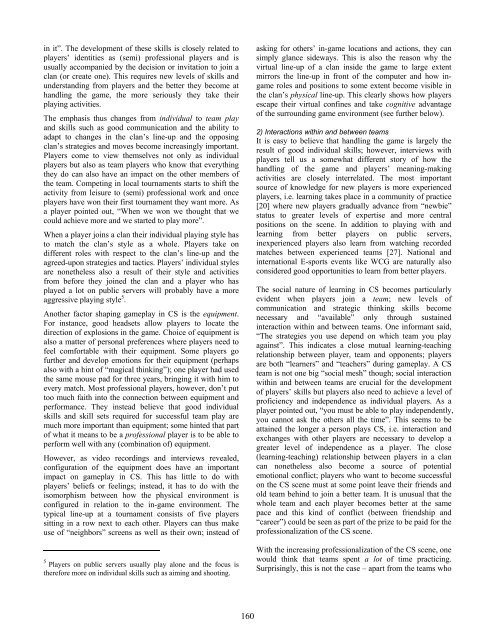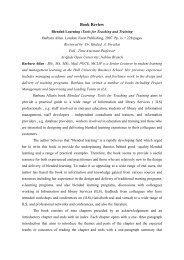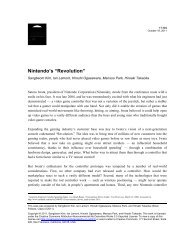07313.16293
Create successful ePaper yourself
Turn your PDF publications into a flip-book with our unique Google optimized e-Paper software.
in it”. The development of these skills is closely related to<br />
players’ identities as (semi) professional players and is<br />
usually accompanied by the decision or invitation to join a<br />
clan (or create one). This requires new levels of skills and<br />
understanding from players and the better they become at<br />
handling the game, the more seriously they take their<br />
playing activities.<br />
The emphasis thus changes from individual to team play<br />
and skills such as good communication and the ability to<br />
adapt to changes in the clan’s line-up and the opposing<br />
clan’s strategies and moves become increasingly important.<br />
Players come to view themselves not only as individual<br />
players but also as team players who know that everything<br />
they do can also have an impact on the other members of<br />
the team. Competing in local tournaments starts to shift the<br />
activity from leisure to (semi) professional work and once<br />
players have won their first tournament they want more. As<br />
a player pointed out, “When we won we thought that we<br />
could achieve more and we started to play more”.<br />
When a player joins a clan their individual playing style has<br />
to match the clan’s style as a whole. Players take on<br />
different roles with respect to the clan’s line-up and the<br />
agreed-upon strategies and tactics. Players’ individual styles<br />
are nonetheless also a result of their style and activities<br />
from before they joined the clan and a player who has<br />
played a lot on public servers will probably have a more<br />
aggressive playing style 5 .<br />
Another factor shaping gameplay in CS is the equipment.<br />
For instance, good headsets allow players to locate the<br />
direction of explosions in the game. Choice of equipment is<br />
also a matter of personal preferences where players need to<br />
feel comfortable with their equipment. Some players go<br />
further and develop emotions for their equipment (perhaps<br />
also with a hint of “magical thinking”); one player had used<br />
the same mouse pad for three years, bringing it with him to<br />
every match. Most professional players, however, don’t put<br />
too much faith into the connection between equipment and<br />
performance. They instead believe that good individual<br />
skills and skill sets required for successful team play are<br />
much more important than equipment; some hinted that part<br />
of what it means to be a professional player is to be able to<br />
perform well with any (combination of) equipment.<br />
However, as video recordings and interviews revealed,<br />
configuration of the equipment does have an important<br />
impact on gameplay in CS. This has little to do with<br />
players’ beliefs or feelings; instead, it has to do with the<br />
isomorphism between how the physical environment is<br />
configured in relation to the in-game environment. The<br />
typical line-up at a tournament consists of five players<br />
sitting in a row next to each other. Players can thus make<br />
use of “neighbors” screens as well as their own; instead of<br />
5 Players on public servers usually play alone and the focus is<br />
therefore more on individual skills such as aiming and shooting.<br />
asking for others’ in-game locations and actions, they can<br />
simply glance sideways. This is also the reason why the<br />
virtual line-up of a clan inside the game to large extent<br />
mirrors the line-up in front of the computer and how ingame<br />
roles and positions to some extent become visible in<br />
the clan’s physical line-up. This clearly shows how players<br />
escape their virtual confines and take cognitive advantage<br />
of the surrounding game environment (see further below).<br />
2) Interactions within and between teams<br />
It is easy to believe that handling the game is largely the<br />
result of good individual skills; however, interviews with<br />
players tell us a somewhat different story of how the<br />
handling of the game and players’ meaning-making<br />
activities are closely interrelated. The most important<br />
source of knowledge for new players is more experienced<br />
players, i.e. learning takes place in a community of practice<br />
[20] where new players gradually advance from “newbie”<br />
status to greater levels of expertise and more central<br />
positions on the scene. In addition to playing with and<br />
learning from better players on public servers,<br />
inexperienced players also learn from watching recorded<br />
matches between experienced teams [27]. National and<br />
international E-sports events like WCG are naturally also<br />
considered good opportunities to learn from better players.<br />
The social nature of learning in CS becomes particularly<br />
evident when players join a team; new levels of<br />
communication and strategic thinking skills become<br />
necessary and “available” only through sustained<br />
interaction within and between teams. One informant said,<br />
“The strategies you use depend on which team you play<br />
against”. This indicates a close mutual learning-teaching<br />
relationship between player, team and opponents; players<br />
are both “learners” and “teachers” during gameplay. A CS<br />
team is not one big “social mesh” though; social interaction<br />
within and between teams are crucial for the development<br />
of players’ skills but players also need to achieve a level of<br />
proficiency and independence as individual players. As a<br />
player pointed out, “you must be able to play independently,<br />
you cannot ask the others all the time”. This seems to be<br />
attained the longer a person plays CS, i.e. interaction and<br />
exchanges with other players are necessary to develop a<br />
greater level of independence as a player. The close<br />
(learning-teaching) relationship between players in a clan<br />
can nonetheless also become a source of potential<br />
emotional conflict; players who want to become successful<br />
on the CS scene must at some point leave their friends and<br />
old team behind to join a better team. It is unusual that the<br />
whole team and each player becomes better at the same<br />
pace and this kind of conflict (between friendship and<br />
“career”) could be seen as part of the prize to be paid for the<br />
professionalization of the CS scene.<br />
With the increasing professionalization of the CS scene, one<br />
would think that teams spent a lot of time practicing.<br />
Surprisingly, this is not the case – apart from the teams who<br />
160





